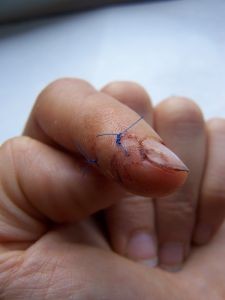Nearly everyone in American ends up watching the Super Bowl. Some are diehard fans of the teams that have made it to the big game, but most are not. Many just watch to see the game played at what is supposed to be its highest level. Other people watch the game because they can bet on everything from the point spread to how long it will take for Lady Gaga to sing the national anthem. In case you were wondering, Las Vegas odds makers set the over/under for that bet at 2 minutes and 20 seconds. There will also be people who couldn’t care less about the game but are interested in the new commercials or the food.
 As for the food, there will be all kinds of good food and beer at most Super Bowl parties, including chicken wings. According to a recent news feature from Oxfam, Super Bowl Sunday is the day on which the most chicken wings in the United States are eaten. With so many more wings being consumed, it is up to the poultry industry and the more than 250,000 poultry workers to meet that demand.
As for the food, there will be all kinds of good food and beer at most Super Bowl parties, including chicken wings. According to a recent news feature from Oxfam, Super Bowl Sunday is the day on which the most chicken wings in the United States are eaten. With so many more wings being consumed, it is up to the poultry industry and the more than 250,000 poultry workers to meet that demand.
There has been a long history of dangerous work conditions and on-the-job accidents in the poultry industry. Many complain about the horrible conditions for the chickens, but, in reality, things are not all that much better for the hundreds of thousands of workers. This is of course during normal working conditions, but in the time leading up to Super Bowl Sunday, things get even more dangerous, as there are typically 1.3 billion chicken wings consumed that day.
In terms of specific on-the-job accidents and workers’ compensation claims, nearly 90 percent of chicken wing cutters suffer from repetitive stress injuries to the point where they are not only in pain all the time, but cannot close their hands to make a fist. The reason for this is because the high amounts of repetitive tasks they are required to perform. For example, a chicken wing cutter is expected to clip one wing every two seconds, or 30 wings per minute. Over the course of entire shift, one worker is expected to clip 20,000 chicken wings. Statistics show the risk for carpal tunnel syndrome for poultry workers is seven times higher than the national average for all workers.
While one would expect this to lead to an increase in workers’ compensation claims, many workers do not file claims, because they are fearful of being fired in retaliation for filing such a claim. However, it is illegal to fire a worker in retaliation for filing a workers’ compensation claim, and if you are concerned, you should discuss these concerns with an experienced Boston workers’ compensation attorney.
To get an idea of the extent of this problem in the poultry industry, its estimated that 60 percent of all workers will suffer and injury or work-related illness as a result of their employment. Of these injured or sick workers, 60 percent of them will not seek any medical treatment whatsoever, as the vast majority have no access to sick leave, and it is not common to receive treatment while on the job.
If you or someone you love has been injured in a Boston work accident, call for a free and confidential appointment at (617) 777-7777.
Additional Resources:
Turn up the heat on Big Poultry this Super Bowl Sunday, February 6, 2016, Oxfam
More Blog Entries:
Increased Fines for Employers Who Do Not Maintain Workers’ Compensation Coverage, July 22, 2011
 Massachusetts Workers Compensation Lawyers Blog
Massachusetts Workers Compensation Lawyers Blog

